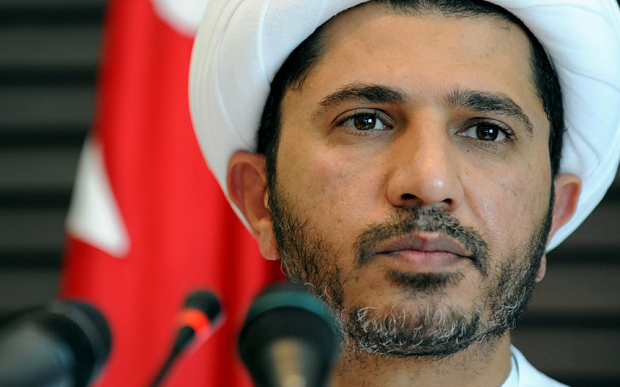On 22 March 2018, Bahrain’s High Criminal Court adjourned the case of imprisoned opposition leader Sheikh Ali Salman along with his two in absentia codefendants, Sheikh Hassan Ali Juma Sultan and Ali Mehdi Ali Al Aswad, until 24 April. All three men are members of Bahrain’s largest political opposition group, Al-Wefaq National Islamic Society, which was forcibly dissolved by the government in 2017.
Sheikh Salman was originally arrested in December 2014 and ultimately sentenced to four years in prison on charges of “inciting disobedience and hatred in the kingdom” for giving speeches in his capacity as Al-Wefaq’s Secretary-General. In November 2017, as Sheikh Salman started to near the end of his sentence, the government abruptly brought on a new set of charges against him and his fellow Al-Wefaq members. These new offenses including “divulging defense secrets to a foreign country, accepting money from a foreign country for providing it with military secrets and details pertaining to the internal situation and disseminating erroneous and false information and allegations abroad in order to weaken financial trust in the Kingdom and undermine its prestige [sic].” The charges appear to stem from an open and well-documented mediation attempt originally launched by the United States during the 2011 unrest, which resulted in preliminary communications between Qatar – as a potential mediator – and the Bahraini government and opposition. Though these interactions have been known since 2011, the accusations were only raised once Bahrain entered into a diplomatic dispute between Qatar and several other countries in the region in June 2017.
Bahrain’s Public Prosecution presented its argument in the new case against Sheikh Salman on 8 March 2018 – calling for the “maximum penalty” to be imposed on him, Sheikh Hassan Ali Juma Sultan, and Ali Mehdi Ali Al Aswad. While the official statement of the Advocate General does not explicitly detail which punishments are sought, the maximum penalty for the charges is death.
This new trial against Sheikh Salman and his codefendants comes as part of the government’s wider assault on independent political and civil society ahead of the 2018 elections for Bahrain’s lower house of parliament. In 2017, the government forcibly dissolved Wa’ad, the largest secular leftist society, and indefinitely suspended Bahrain’s only independent newspaper, Al-Wasat. Additionally, in 2018 Bahrain’s Court of Cassation ruled to uphold the arbitrary dissolution of Al-Wefaq, and the authorities have continued to harass members of the smaller al-Wahdawi society, the only opposition group that has yet to be formally shut down by the government. These actions have all but closed political space in Bahrain, leaving virtually no opposition remaining as the election nears.
The Bahraini government has violated Sheikh Ali Salman’s rights to liberty, fair trial, free expression, and free association as defined in articles 2, 9, 10 11, 18, 19, 20 and 21 of the Universal Declaration of Human Rights (UDHR) and articles 9, 14, 18, 19, 21, 22, 25, and 26 of the International Covenant on Civil and Political Rights (ICCPR). ADHRB calls for the Government of Bahrain to immediately release Sheikh Ali Salman, as well as all other prisoners of conscience, and reinstate all arbitrarily dissolved political societies, such as Al-Wefaq and Wa’ad, in order to open space for opposition prior to the upcoming elections.





